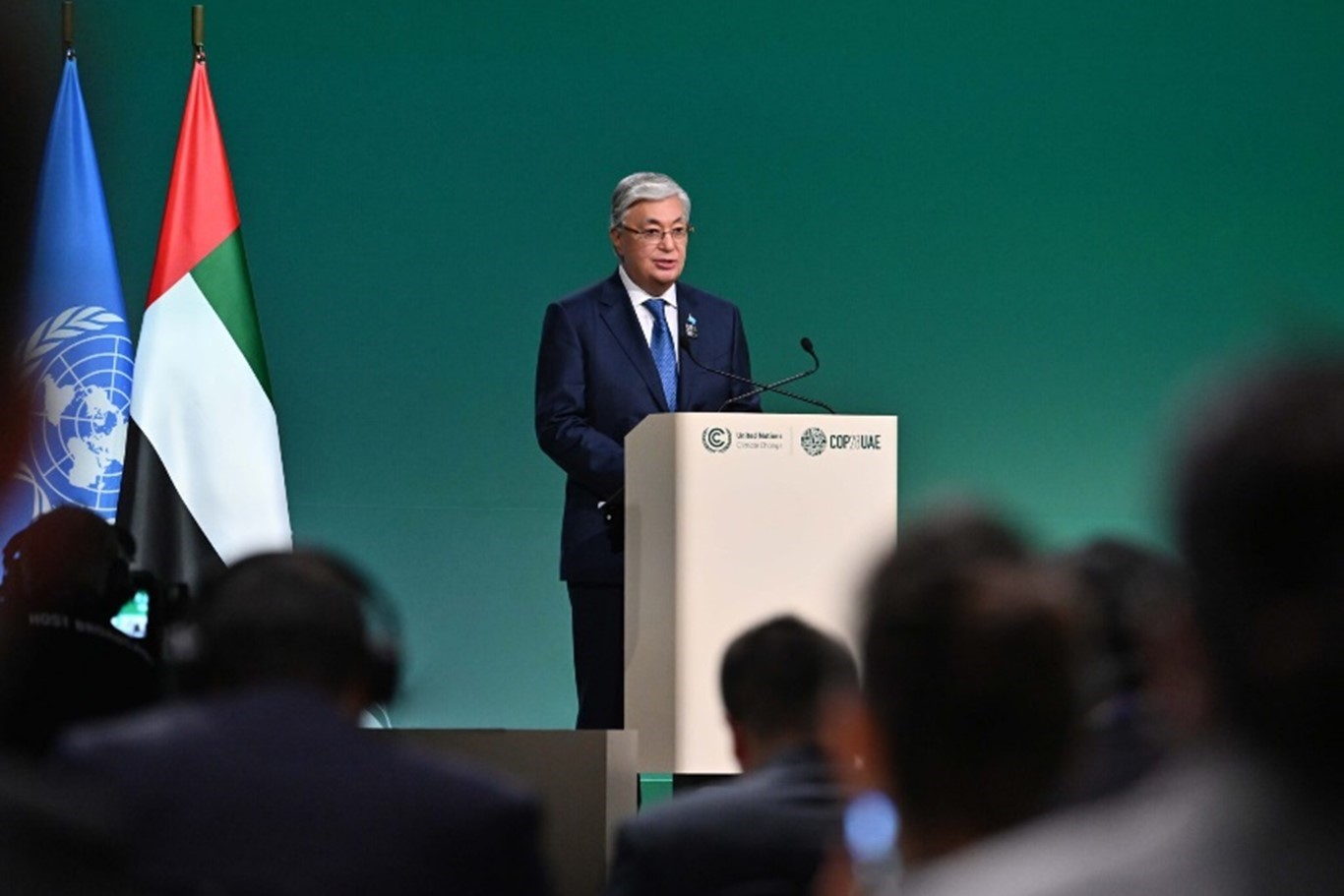
Tokayev addresses world leaders at the COP 28 Summit. Source: Astana Times
President Tokayev joined other world leaders to discuss the threats facing Central Asia and the global community from climate change at COP 28 in Dubai, United Arab Emirates. Addressing the leaders at the summit, Tokayev stated the unique position that Kazakhstan was in to aid in a decarbonizing and greener future for the world. He cited that Kazakhstan possesses 43% of global uranium reserves, a major potential for renewable energy like wind and solar and significant deposits of rare earth metals. In addition to presenting Kazakhstan as a supporting nation in fighting climate change, the president also addressed some of the threats facing Central Asia and the rest of the world, even as efforts are taken to mitigate against the worst impacts of climate change. Tokayev stated that rising temperatures will likely lead to water shortages and desertification of much of Central Asia and the rest of the world if stronger efforts are not taken by the global community to limit climate change (Astana Times). On the sidelines of COP, Tokayev met with officials from the UAE government to discuss low-carbon investments, as well as a development initiative in ports on the Caspian Sea in an effort to further green investments from abroad and enable Kazakhstan to be a regional leader in green development (Tengri News).
Indonesia’s Ambassador to Kazakhstan Mochamad Rachman met with members of the local press to discuss the strengthening of the countries’ bilateral relations – namely the increasing of trade ties and securing rare earth metals for Indonesia. Ambassador Rachman expressed that Indonesia’s President Joko Widodo sought to increase the trade of goods between both countries to $1 billion by the end of 2024 up from $700 million this year and to diversify the nature of goods sent to include electric car batteries and electronic goods from the Indonesian side and rare earth metals from the Kazakh side. Additionally, the ambassador hoped to increase digital economic ties between Kazakhstan and Indonesia and increase the number of flights between Kazakhstan and destinations in Indonesia like Bali and Jakarta (Astana Times). The meeting further acted as a commemoration between both states to name Astana and Indonesia’s soon-to-be capital city Nusantara as sister cities. Ambassador Rachman stated his hope for Kazakhstan to aid Indonesia with its experience in building its own planned capital, Astana (Kazinform).
In an annual meeting, Uzbekistan’s Senate amended the country’s electoral system to include a larger role for political parties in shaping the composition of the Oliy Majlis, the country’s parliament, in shaping future elections. The reforms deepen democratic reforms in the country, creating a mixed-electoral system that will enable seventy five candidates to be elected through a majoritarian vote, while the remaining seventy five will be selected through proportional representation from a party-chosen list of candidates (Gazeta.uz). The reforms further enforce term limits on the officials making up Uzbekistan’s Central Electoral Commission, who monitor the elections, and increase the percentage of female candidates on the political parties’ electoral lists from thirty to forty percent (UZ Daily).
The Chairmen of the State Committee for National Security of Kyrgyzstan and Tajikistan met this week to finalize months of negotiations to resolve the two countries’ border disputes, which caused conflict last year. The meeting between these two leaders revolved around the use of roads and facilities in disputed territorial exclaves between both countries. The meeting concluded with both sides agreeing to each other’s ownership and sovereignty over these exclaves, while allowing for reciprocal use of the territories by Kyrgyzstani and Tajikistani citizens (24.kg). After the meeting, both sides announced that as negotiations wind down between both sides, the border disputes will soon be resolved (Sputnik).
The interim Interior Minister of Afghanistan, Sirajuddin Haqqani, met with the head of the United Nations Assistance Mission in Afghanistan (UNAMA) and former President of Kyrgyzstan, Roza Otunbayeva to create a dialogue with the international community to resolve the migrant crisis in Afghanistan, the drug trade and to ensure that the country remains stable. On the migrant crisis the Taliban’s Haqqani stated that the current regime has not done a lot to build refugee facilities for Afghani returnees and emphasized that “past problems and shortcomings should not be linked to the Islamic Emirate” (Tolo News; Afghanistan Times). Samuel Opoku-Agyakwa, the Director of the Rule of Law Section for UNAMA further met with Afghanistan’s Finance Minister to discuss reforms to the country’s tax-collection system and discussed efforts the Taliban regime could take to reduce corruption within the government and institutions throughout the country (Bakhtar News Agency).

